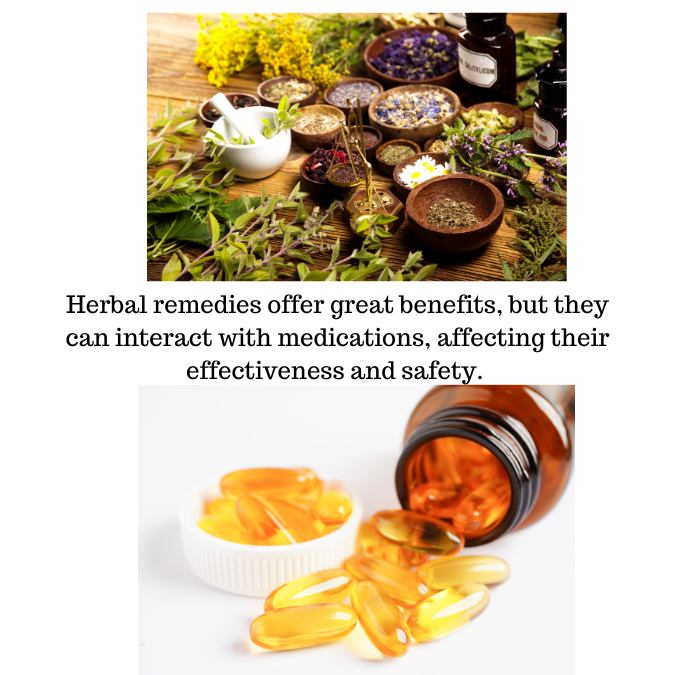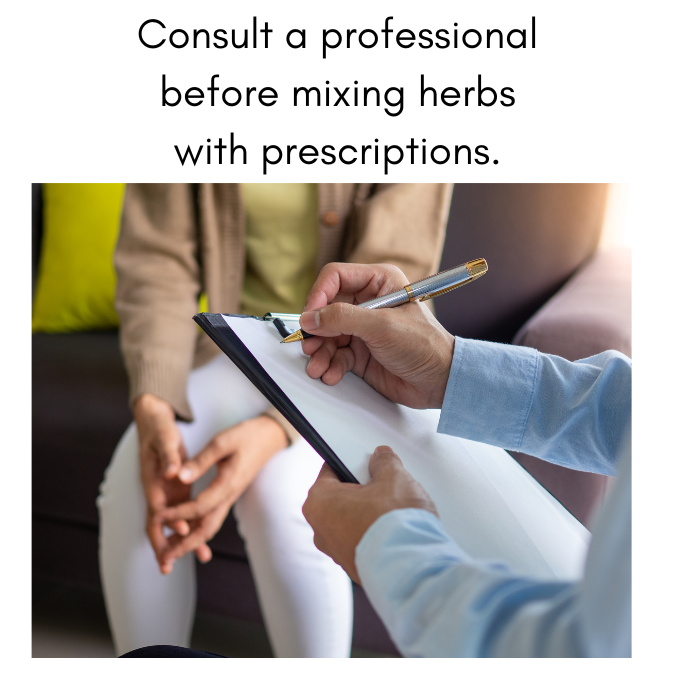Top 5 Western & Chinese Herbs with Drug Interactions: What You Need to Know Before Mixing Herbs & Medications
Mar 13th 2025
Are Your Herbal Remedies Safe to Take with Medications?

Herbal medicine has been used for centuries to promote healing, strengthen immunity, and restore balance in the body. From St. John’s Wort in Western herbalism to Dan Shen in Traditional Chinese Medicine (TCM), countless herbs offer powerful health benefits. However, what many people don’t realize is that herbs can interact with prescription medications, potentially reducing drug effectiveness or increasing health risks.
Whether you’re taking blood thinners, antidepressants, or heart medications, certain herbs may alter drug metabolism, enhance side effects, or cause dangerous interactions when taken together. For example, St. John’s Wort can weaken birth control pills, while Dan Shen may intensify the effects of anticoagulants like Warfarin. Understanding these interactions is crucial for ensuring safety and efficacy in your health regimen.
In this guide, we’ll explore the top 5 Western herbs and top 5 Chinese herbs known for drug interactions, backed by scientific research. You’ll learn:
✅ Which herbs can interfere with medications
✅ The most common drug interactions to watch for
✅ How herbal remedies impact the body’s metabolism
✅ Safe usage guidelines for combining herbs and pharmaceuticals
By staying informed, you can make smarter health choices and use herbal medicine safely alongside modern treatments. Let’s dive into the science behind herb-drug interactions and how you can avoid potential risks!
Top 5 Western Herbs and Their Drug Interactions
St. John's Wort (Hypericum perforatum)
Uses: Commonly used for mild to moderate depression.nypost.com
Interactions: St. John's Wort can induce the activity of cytochrome P450 enzymes, particularly CYP3A4, leading to reduced plasma concentrations of various drugs, including:en.wikipedia.org+1en.wikipedia.org+1
Antidepressants: May cause serotonin syndrome when combined with SSRIs.
Oral Contraceptives: Can decrease effectiveness, leading to unplanned pregnancies.
Anticoagulants (e.g., warfarin): May reduce anticoagulant effect, increasing clotting risk.
Immunosuppressants (e.g., cyclosporine): Can lead to transplant rejection due to reduced drug levels.
Antiretrovirals (e.g., indinavir): Decreased efficacy in HIV treatment.
Anticancer Drugs (e.g., irinotecan): Reduced therapeutic effect.
- These interactions are primarily due to the induction of drug-metabolizing enzymes and transporters by St. John's Wort.
Ginkgo (Ginkgo biloba)
Uses: Enhances cognitive function and peripheral circulation.
Interactions: Ginkgo has antiplatelet properties, which can potentiate the effects of anticoagulant and antiplatelet medications, leading to an increased risk of bleeding when taken with:PLOS Journals+1pmc.ncbi.nlm.nih.gov+1
Warfarin
Aspirin
Clopidogrel
- Caution is advised due to the potential for serious bleeding events.
Garlic (Allium sativum)
Uses: Cardiovascular health, antimicrobial properties.
Interactions: Garlic can enhance the effects of anticoagulant medications, increasing bleeding risk when combined with:
Warfarin
Aspirin
Nonsteroidal Anti-Inflammatory Drugs (NSAIDs)
- Additionally, garlic has been found to decrease the plasma concentration of saquinavir, an antiretroviral drug, potentially reducing its efficacy.
Ginseng (Panax ginseng)
Uses: Boosts energy, supports immune function.
Interactions: Ginseng may decrease the effectiveness of anticoagulants like warfarin, potentially increasing the risk of clot formation. It may also cause headaches, tremors, and manic episodes when combined with monoamine oxidase inhibitors (MAOIs). en.wikipedia.org
Echinacea (Echinacea purpurea)
Uses: Immune system support, common cold prevention.
Interactions: Echinacea can inhibit cytochrome P450 enzymes, potentially leading to increased blood levels of certain drugs, such as:
Caffeine
CYP1A2 substrates
- This inhibition can result in adverse effects due to higher drug concentrations.

Top 5 Chinese Herbs and Their Drug Interactions
Danshen (Salvia miltiorrhiza)
Uses: Cardiovascular conditions, blood circulation improvement.
Interactions: Danshen has antiplatelet effects and can enhance the anticoagulant effect of warfarin, increasing bleeding risk. PLOS Journals
Dong Quai (Angelica sinensis)
Uses: Women's health, anemia, menopause symptoms.
Interactions: Dong Quai contains coumarin derivatives, which can potentiate the effects of anticoagulants like warfarin, leading to an increased risk of bleeding.
Licorice (Glycyrrhiza uralensis)
Uses: Respiratory issues, digestive problems.
Interactions: Licorice can cause potassium depletion, leading to hypokalemia. This effect can enhance the toxicity of drugs like digoxin. Additionally, it can interfere with antihypertensive medications, potentially causing elevated blood pressure. en.wikipedia.org+1ethnomed.org+1health.comethnomed.org
Ginger (Zingiber officinale)
Uses: Digestive aid, anti-nausea.
Interactions: Ginger has antiplatelet properties and can increase bleeding risk when taken with anticoagulants such as warfarin and aspirin. PLOS Journals
Turmeric (Curcuma longa)
Uses: Anti-inflammatory, antioxidant.
Interactions: Turmeric can inhibit CYP1A2 and CYP3A4 enzymes, potentially affecting the metabolism of various drugs, including certain antidepressants and antipsychotics. This inhibition can lead to altered drug levels and efficacy. Herbal Reality
Conclusion: Stay Informed & Use Herbal Remedies Safely
Herbal medicine offers powerful health benefits, but when combined with prescription medications, it can lead to unexpected interactions that may impact your health. From St. John’s Wort reducing the effectiveness of antidepressants to Danshen increasing the risk of bleeding with blood thinners, it’s clear that not all herbs are safe to mix with medications.
To ensure safety and effectiveness, always follow these key guidelines:
Consult a Healthcare Professional – Before starting any herbal supplement, especially if you're taking prescription medications, speak with your doctor, pharmacist, or herbalist.
Research Potential Interactions – Not all herb-drug interactions are widely known. Stay informed by checking reliable sources such as scientific studies, medical websites, and published research.
Monitor Your Body’s Response – If you experience side effects, unusual symptoms, or reduced medication effectiveness, stop the herb and consult a professional immediately.
Use Trusted Herbal Products – Ensure your herbs are high-quality, properly sourced, and free from contaminants, as poor-quality herbs may contain harmful additives that worsen interactions.
Final Thought:
Herbs and pharmaceuticals can work together when used correctly, but lack of awareness about potential interactions can lead to serious health risks. By staying informed, cautious, and consulting professionals, you can enjoy the best of both traditional and modern medicine—safely and effectively.
If you found this guide helpful, share it with others who use herbal remedies! Let’s spread awareness and ensure everyone can use herbal medicine safely.



